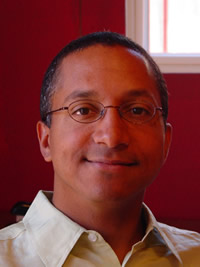
When Ethnic Studies Professor David Pellow was in college, his burgeoning interest in social inequality issues and the world around him almost led him to pursue a career path in political science. One thing caused him to re-consider.
“When I really stopped and thought about what I wanted to study, I realized that all the classes I enjoyed most were taught by sociologists,” he recalls. “So I made a choice to study sociology instead.”
The rest, as they say, is history.
After graduating summa cum laude from the University of Tennessee, Knoxville, the Nashville native went on to obtain his Ph.D. in sociology from Northwestern University. He then spent a year at the University of California, Berkeley, conducting research in health policy before becoming an assistant professor in the ethnic studies and sociology departments at the University of Colorado at Boulder.
Pellow stayed at Boulder for four years before joining UC San Diego’s Department of Ethnic Studies in 2002. But it wasn’t just the promise of an associate professor position and plenty of sunshine that lured the outdoor enthusiast to San Diego.
“Although I was happy to be offered a faculty position, one of the main reasons I came to UCSD is because I was asked to become the director for California Cultures in Comparative Perspective,” he says. “It was an opportunity I couldn’t pass up.”
The California Cultures initiative fosters creative research, teaching and collaboration among faculty, students and the public to explore the broad implications of the history and current growth of the state’s immigrant and people of color populations. The program focus was a natural fit with Pellow’s research background and interests in racial and ethnic inequality, environmental justice studies, labor studies, immigration and social movements.
“One of the greatest challenges facing California is diversity,” notes Pellow. “UC San Diego is uniquely positioned to assume a leadership role in addressing the complex questions that affect the future of the state population. I’m excited to be a part of it.”
In addition to serving as the director of the California Cultures initiative and teaching, Pellow is also conducting research focusing on immigration and international issues. One project he’s working on traces the history of an immigration debate near Aspen, Colorado and the potential effect on the ecology of the area. Another project he’s involved in is the Superfund Basic Research Program, in which scientists from around the country research scientifically and culturally sound ways to clean up hazardous waste sites. He is also co-authoring a book on environmental sociology called The Treadmill of Production: Injustice and Unsustainability in the Global Economy, which is due to be published in May and is one of his numerous books and articles on environmental justice issues.
Pellow attributes the strong environmental angle that runs through his work to all the camping and outdoor activities his family did while he was growing up.
“We traveled throughout the U.S. and went to a lot of national and state parks” he says. “It’s how I developed my love of nature.”
Another important aspect of his research?
“I like telling stories that haven’t been told and that most scholars haven’t paid attention to,” he says. “I try to contribute knowledge that is more digestible, not just to the academic community, but to the broader community.”
He continues: “When someone can use my work to make a case for an issue or a case for change, that’s when I’m most proud.”
|